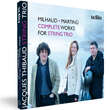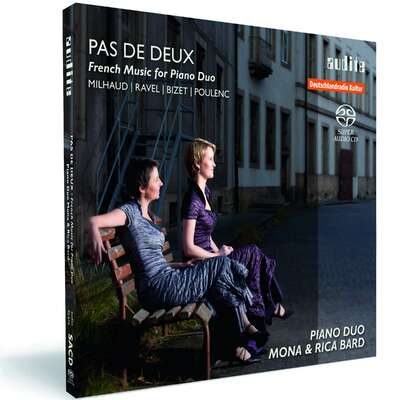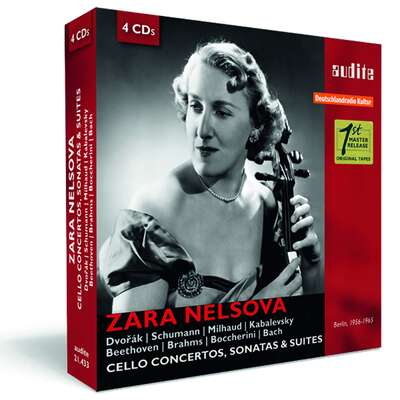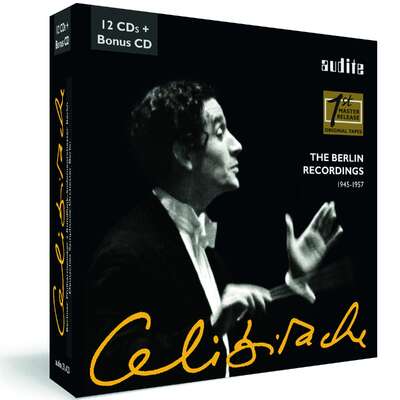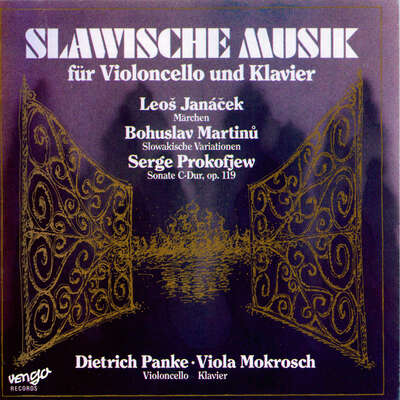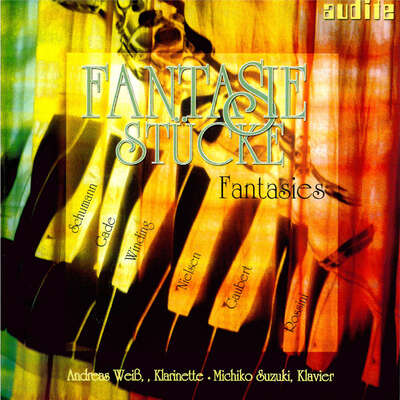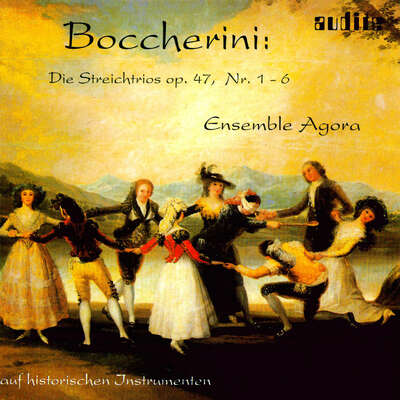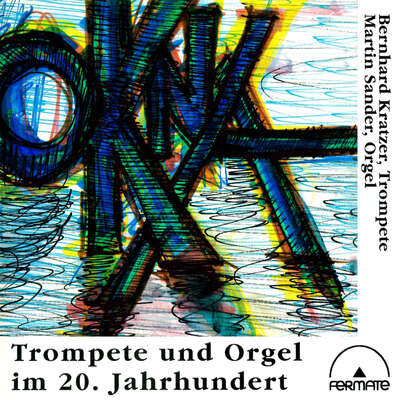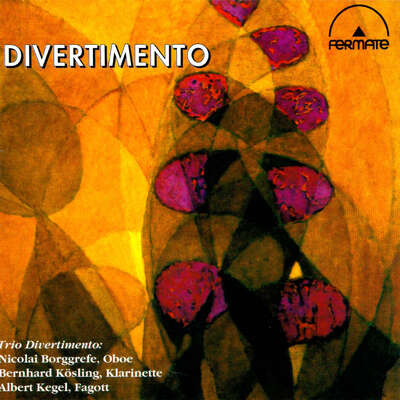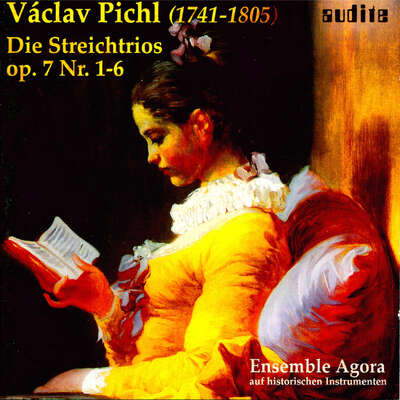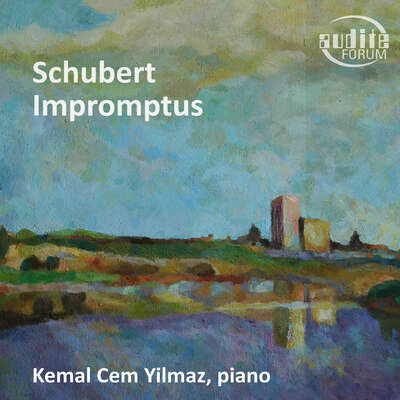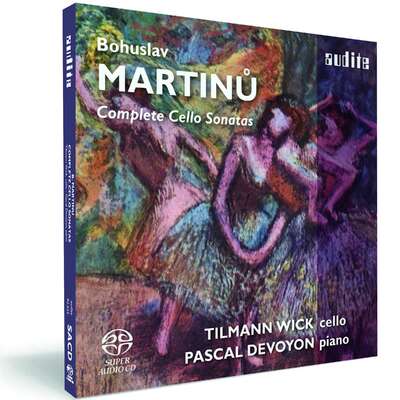
Darius Milhaud and Bohuslav Martinů – contemporaries during the early twentieth century: contrasting both composers’ complete works for string trio reveals four marvels of intimate music-making, realised by the Jacques Thibaud Trio with their own artistic instinct and flair.more
"[...] vom Jacques Thibaud Streichtrio agil und farbig gespielt – mit viel Gespür für Ecken und Kanten." (BR 4 Klassik)
Details
|
Darius Milhaud & Bohuslav Martinů: Complete Works for String Trio
String Trio, Op. 274 & Sonatine à trois, Op. 221b - String Trios No. 1 & 2 |
|
| article number: | 97.727 |
|---|---|
| EAN barcode: | 4022143977274 |
| price group: | BCA |
| release date: | 21. July 2017 |
| total time: | 58 min. |
Bonus Material
Informationen
There are several parallels to be found in the lives of the Southern French composer Darius Milhaud (1892-1974) and the Moravian-Bohemian composer Bohuslav Martinů (1890-1959). Both needed the metropolis of Paris, that seething artistic melting pot after the First World War, in order to refine their originality; both were open to all kinds of musical styles, from South American folklore to North American jazz through to Bachian counterpoint; finally, both had to flee the Germans in France in 1940, heading for the USA - Milhaud on account of being a Jew, and Martinů as a patriotic Czech in exile.
The two composers' complete works for string trio, contrasted here for the first time, uncover various similarities - even though each work bears the hallmarks of its composer, and Martinů's trios were written in Paris, whilst Milhaud did not compose his until he had reached America. The works are characterised by a playful, spirited tone as well as the charm of Mediterranean and Czech folk tunes. But there is also what Milhaud termed, and valued, as "discipline" in chamber music: strict counterpoint and technical skill - utilised radically, without slipping into dry pedantry.
These are four marvels of intimate music-making, assembled by the Jacques Thibaud Trio with their own artistic instinct and flair.
Reviews
www.recordsinternational.com | 01.09.2018 | September 1, 2018 | source: https://www.reco...
This is at least the third recording of Martinů’s first trio (1924), only discovered in 2005 and which, along with the later trio from 1934, areMehr lesen
www.qobuz.com | 12.06.2018 | June 12, 2018 | source: https://www.qobu...
Dieses letztere [Streichtrio Nr. 10] strotzte vor Energie und geriet nicht in Vergessenheit wie das erste und ist und bleibt ein großer Favorit zahlreicher Musiker.Mehr lesen
De Gelderlander | 09-05-18 | Maarten-Jan Dongelmans | May 9, 2018 | source: https://www.geld... Berlijns strijktrio biedt geweldige verdieping van zeggingskracht
Het is een zelfbewust stuk met een eigenzinnige mix van virtuositeit en lyriek. Het Jacques Thibaud String Trio speelt hier zijn sterkste troeven uit.Mehr lesen
www.musicweb-international.com | Friday February 2nd | Claire Seymour | February 2, 2018 | source: http://www.music...
Darius Milhaud is perhaps rivalled only by Paul Hindemith among twentieth-century composers for his substantial and varied oeuvre of chamber music. InMehr lesen
He also looked back to his childhood: ‘I took part in too much chamber music in my youth: sonatas, trios, quartets-played with my father at home or with the quartet of my dear old Bruguier [his violin teacher], not to have retained the taste for it. And besides, it is a form, the quartet above all, that conduces to meditation, to the expression of what is deepest in oneself – it is very satisfying for its austerity, for its character as essentially a vehicle of pure music, and also for the economy of means to which one must adapt oneself. It is at once an intellectual discipline and the crucible of the most intense emotion.’
This disc, which presents not the string quartets but Milhaud’s two works for string trio, alongside those by Bohuslav Martinů, confirms that the string trio medium can be every bit as intense, austere and disciplined as the more prevalent quartet idiom.
In the hands of the Jacques Thibaud String Trio, the first movement of Milhaud’s String Trio No.1 (1947) springs nimbly into vibrant life, propelled by Bogdan Jianu’s incisive cello pizzicatos which seem to flip forward the freely flowing contrapuntal interplay of the two upper strings. Vif is the first of five short movements in which brevity is no barrier to Milhaud’s fecundity or breadth of invention. If not all the musical ideas are necessarily striking or memorable, the Jacques Thibaud Trio takes care to emphasise the melodic grace and rhythmic thrust of the small motifs which tumble forth. The lines are cleanly articulated and there is a good balance between the three voices as, even in this opening miniature, they range – often in the blink of an eye – from high to low, from diatonicism to dissonance, from strength to a whisper, from well-tuned unisons to vigorous counterpoint.
There’s no lack of timbral contrast either. Modéré opens with grainy chords, which resonate with a warm folky jangle, while the gentle melodic probings unfold sweetly. In the central Sérénade the players take turns to dance in sprightly style above pizzicato strumming, coming together for more sentimental reflection. The counterpoint of Canons generates thoughtful intensity – the cello’s songful tone, in particular, draws the ear into the arguments – while in the concluding Jeu Fugué intertwining lines patter forth with wit and dexterity.
There was to be no String Trio ‘No.2’ from Milhaud, but he had composed a Sonatina à trois for the same forces in 1940. While the counterpoint here seems more ‘scholarly’ than ingenious, the Jacques Thibaud Trio’s soft-toned warmth and appealing colours injects some charm into the first two brief movements, and the pizzicatos of Animé are pert and perky beneath Burkhard Maiß’s high-rise surfing and Hannah Strijbos’ rich slithers.
Martinů’s interest in the music of Debussy and Ravel led him, in the early 1920s, from his native Czechoslovakia to Paris, where he studied with Albert Roussel, and it was during this time that his first String Trio (1924) was composed. The work inevitably reflects Martinů’s exposure to a variety of new forms of musical expression. And, as Paris in the Twenties was a veritable musical melting pot, one hears robust folksiness alongside hazy jazz hues, as vigorous counterpoint is countered by impressionistic colorism.
The interpretative and virtuosic demands are more challenging here than in Milhaud’s two slender trios. All three instruments are pushed to high-lying extremes, but the players sustain tonal beauty and precision – Maiß’s violin glistens like a thread of silver – and they embrace the score’s delicacies and abrasiveness with equal command and care. The Andante is played with especial beauty and real tenderness: perhaps it’s fanciful, but one feels that one can hear Bohemian sentiments of love, longing and loss here, though in the chordal climax, as the strings combine in a rich blend that seems to comprise many more than three voices, there is a compelling sense of release and joy. The final Poco Allegro has an improvisatory and infectious joie de vivre, as if Martinů was rambling, in his memory, through a Czech village, hearing snatches of language, song and dance, as the music of modern-day Paris drifted through his open window. In this movement, the Jacques Thibaud Trio creates a driving dynamism, which is brusque, brisk and breezy.
The Second Trio was written ten years later. It is performed here with impressive accord and insight as romantic and modern sentiments again collide, or rather, are assimilated. The Jacques Thibaud Trio has a strong appreciation of the structure and idiom, and displays technical mastery in sustaining a persuasive tautness. In the Allegro, textures feel sinewy, whether the three string parts are conversing, sometimes ferociously, or melodising expressively. The motoring repetitions of the concluding episode are tremendously exciting and resolve into juicily satisfying fat cadential chords. Jianu’s solo introduction to the Poco moderato is played with a heart-touching eloquence which avoids sentimentalism, and which takes a piquant turn in the ensuing Vivo, with its whipping glissandi, chuntering repetitions, fizzing trills and flutterings, and string-slapping pizzicatos.
This is a refreshing recording. The Jacques Thibaud String Trio has lavished care and attention on these small forms, confirming without doubt that ‘slight’ does not mean a lack of musical substance or sincerity.
American Record Guide | January / February 20218 | Stephen Estep | January 1, 2018 | source: http://argsubson...
We’ve reviewed the Jacques Thibaud Trio (formed in Berlin in 1994) three times on Audite, and our critics praised them for their playing (Beethoven,Mehr lesen
Milhaud’s Trio and Sonatine a Trois aren’t top-shelf, though he is usually charming, at least. Martinu’s First Trio (1924) has a wild, swooping opening that settles into a gentle, chromatic melody. II is beautiful, with a sort of lean, specifically Czech, romantic expressionism. The rhapsodic III has the most folk-influenced writing I’ve heard from him. His Second Trio, from 1934, is more mature; it’s a playful mixture of earthy, ethnic writing and more sophisticated work. The First Trio has only been recorded a few times (I believe it was only rediscovered in 2005). The Lendvai Trio recorded both along with Enesco’s Aubade and Francaix’s trio on Destination Paris for Stone Records; I’ve only heard the first movement from the First Trio, but their sound is more satisfying, and their playing is more intense. Praga has released the same recording of the Duos and Trios twice, once under the players’ individual names and once under the Beethoven String Trio. Again, I’ve only heard a small sample, but, like the Thibaud Trio, their tone is bright, and their intonation isn’t the best. I can’t recommend this recording, but it has whetted my appetite for the Lendvai recording.
Fono Forum | Januar 2018 | Michael Kube | January 1, 2018 KRITIKER-UMFRAGE 2017
Welche fünf CDs haben Sie im vergangenen Jahr am meisten beeindruckt? Das haben wir wie in jedem Jahr unsere Rezensenten gefragt, die das GeschehenMehr lesen
Von wegen Randrepertoire. Das fulminante Berliner Thibaud Trio macht mit seiner Spiellaune diese Musik ganz groß.
Fono Forum | Dezember 2017 | Giselher Schubert | December 1, 2017
Darius Milhaud und Bohuslav Martinu zählen zu den fruchtbarsten Komponisten des 20. Jahrhunderts. Das innere Kraftzentrum ihrer schierMehr lesen
Beide Komponisten gestalten ihre Streichtrios – im Vergleich zu den Streichquartetten oder Klaviertrios – gewissermaßen "unterhaltender", leichter, ja beschwingter, aber kaum nachlässiger: Milhaud durch das Integrieren von Charakterstücken, zu denen er auch den Kanon oder die Fuge zählte, Martinu eher durch konzertante Züge. Und beide Stilbereiche beherrscht das 1994 in Berlin gegründete Jacques Thibaud String Trio angemessen zwanglos.
Die Fuge, die Milhauds divertimentohaftes Streichtrio beschließt, gestalten sie wirklich als niveauvolles "Spiel" ("Jeu Fugue"), und dem ersten Streichtrio von Martinu geben sie konzertant-virtuose Züge, welche diese Musik aus kammermusikalischer Enge befreit. Dabei bewahren sie aber grundsätzlich immer den kammermusikalischen Duktus, sodass das schiere Musikmachen, welches ihr Interpretieren prägt, keinesfalls solistisch überbordet. Kurz: Dies ist eine hoch willkommene Ergänzung und Bereicherung von Kammermusik aus Frankreich.
Musik & Theater | 11/12 November/Dezember 2017 | Burkhard Schäfer | November 1, 2017 Die Entdeckung
Unter den Händen der Thibauds erfährt das Werk hier eine gloriose Auferstehung auf CD. Überhaupt scheint das Ensemble bei dieser von mediterranem Geist und französischer Clarté durchhellten Musik [...] zur Höchstform aufzulaufen. Messerscharf, kristallklar und luzide ist ihr Spiel, dabei farbintensiv wie eine kolorierte Postkarte aus der Provence.Mehr lesen
www.limelightmagazine.com.au | 20.10.2017 | Warwick Arnold | October 20, 2017 Martinů’s trios prove the find amongst twin prolific streams
The Jacques Thibaud String Trio prefer unvarnished rustic truth to polished urbanity—their fearless approach suits the Martinů. They do not shy away from some uncomfortable sounds but throw themselves at the works with such conviction as to win me over.Mehr lesen
Crescendo Magazine | Le 15 octobre 2017 | Bruno Peeters | October 15, 2017 | source: http://www.cresc... Une musique exigeante mais qui procure un grand plaisir
Parent pauvre du répertoire de musique de chambre, le trio à cordes aMehr lesen
www.opusklassiek.nl | oktober 2017 | Siebe Riedstra | October 1, 2017 | source: https://www.opus...
Zij spelen met superieure techniek, energie, muziekliefde, expressiviteit en plezier. De mooi volle klank van de drie instrumenten staat gelijkwaardig in de ruimte. Laat u verrassen door deze ongewone kamermuziek. Uitvoering en opname: geweldig.'Mehr lesen
Record Geijutsu | 2017.10 | October 1, 2017
Japanische Rezension siehe PDF!Mehr lesen
Bayern 4 Klassik - CD-Tipp | 25.08.2017 | Kristin Amme | August 25, 2017 | source: https://www.br-k...
CD-TIPP
Streichtrios von Milhaud und Martinu
Der Komponist Darius Milhaud liebte es von Trubel und Lärm umgeben zu sein, während er seine Stücke schrieb. Ein lautes Café? Ein dröhnenderMehr lesen
Milhaud oder Martinu? Martinu oder Milhaud? Der Unterschied ist beim ersten Hören gar nicht so leicht festzustellen. Beide Komponisten verbindet nicht nur biografisch, sondern auch musiksprachlich viel. Dennoch – Darius Milhaud und Bohuslav Martinu haben ihren Kompositionen für Streichtrio durchaus eine jeweils eigene Handschrift verpasst: die eine, nämlich die von Milhaud, durchzogen von fein geflochtenen Melodielinien, luftig und wirrschnell. Martinus Tonsprache hingegen präsentiert sich voll satter Klangfülle, Dvorák nicht unähnlich, sanft wiegend, orientalisch blühend, dabei nie sentimental.
Wie aus einem Guss
Diesen Feinheiten widmet sich das international besetzte Jacques Thibaud Streichtrio aus Berlin auf seiner neuen CD. Seit fast 25 Jahren fokussieren sich die drei Musiker auf eine Gattung, die von Komponisten eher stiefmütterlich behandelt wird. Und für die es kaum Ensembles gibt, weil sich meist einfach drei Solisten dafür zusammen tun. Dass es sich lohnt, als eingespieltes Ensemble an die Streichtrios heranzugehen, zeigt sich auf dieser CD. Der Gesamtklang des Jacques Thibaud Streichtrios ist wie aus einem Guss.
Anspruchsvoller Hörgenuss
Manchmal kehrt das Ensemble vielleicht das Spröde an den Stücken von Martinu und Milhaud etwas zu stark heraus. Da splittern die Klänge, werden Töne rissig und rau. Doch auch wenn die eine oder andere Melodie noch mehr blühen könnte: Insgesamt ist diese CD ein Hörgenuss. Und sie hebt einen Schatz selten zu hörender Streichtrios.
Kurzweilig und modern
Es ist das erste Mal, dass Bohuslav Martinus und Darius Milhauds Gesamtwerk für Streichtrio auf einer CD erscheint. Da fragt man sich: Warum erst jetzt? Nicht nur wegen der sich aufdrängenden Gemeinsamkeiten zwischen Martinu und Milhaud – zum Beispiel ihrer Liebe zu Paris, diesem Brennpunkt der Avantgarde, in dem beide nach dem Ersten Weltkrieg lebten, bis sie 1940 vor den Deutschen in Richtung USA fliehen mussten. Die Frage, warum erst jetzt, stellt sich vor allem deshalb, weil das hier einfach gute Musik ist. Kurzweilig, modern, dabei so gar nicht zwölftönig wie beim Zeitgenossen Schönberg. Und vom Jacques Thibaud Streichtrio agil und farbig gespielt – mit viel Gespür für Ecken und Kanten.
RBB Kulturradio | 09.08.2017 | Dirk Hühner | August 9, 2017 | source: https://www.kult...
Das Berliner Jacques Thibaud Streichtrio hat sich mit seinem Namen der französischen Tradition verpflichtet. Auf seiner neuen CD interpretiert esMehr lesen
Viel verbindet die beiden Komponisten Darius Milhaud und Bohuslav Martinů: Beide sind um 1890 geboren, beide haben in Paris studiert und beide sind im zweiten Weltkrieg in die USA emigriert. In ihrer Haltung sind sie jedoch vollkommen unterschiedlich. Der erfahrungsfreudige Südfranzose Milhaud nahm multikulturelle Einflüsse auf wo immer er konnte und komponierte munter ein Stück nach dem anderen. Martinů trug dagegen schwer an der tschechischen Tradition und fand wenig Anerkennung für seine Musik. Zum Glück für das Jacques Thibaud Streichtrio haben beide je zwei Trios geschrieben, die zusammen genau auf eine CD passen.
Internationales Trio, eng aufeinander eingeschworen
Das 1994 an der Berliner Universität der Künste gegründete Jacques Thibaud Streichtrio hat inzwischen eine internationale Besetzung. Die Mitglieder kommen aus Düsseldorf, Bukarest und Amsterdam und sind so eng aufeinander eingeschworen, wie es selten zu hören ist. Über einem vom Cello sonor grundierten Fundament entfalten sich die anderen beiden Instrumente in großer Freiheit, aber nie so weit, dass eines heraussticht. Wärme und Festigkeit prägen den Gesamtklang.
So lassen die drei Musiker in den leichtfüßigen Serenaden-artigen Trios von Milhaud durchaus auch ernstere Töne aufscheinen, was besonders den kontrapunktischen Fugen- und Kanon-Sätzen zu Gute kommt. Bei Martinù betont die saftige Interpretation durchaus die Verwandtschaft zu Dvořák, führt aber auch die aufgeladene Atmosphäre der Pariser Zwanzigerjahre vor Ohren. Insgesamt eine äußerst kurzweilige CD, die eine Moderne jenseits von Schönberg aufleben lässt und die das schmale Repertoire für Streichtrio wesentlich bereichert.
https://artmusiclounge.wordpress.com | August 5, 2017 | Lynn René Bayley | August 5, 2017 | source: https://artmusic... The Thibaud String Trio plays Milhaud & Martinů
[...] the Jacques Thibaud Trio really digs into this music, showing us that they have depth and soul and not just good chops. [...] I was absolutely bowled over by this CD, and Thibaus String Trio is now on my radar as one chamber group to look out for. Dig it!Mehr lesen
Süddeutsche Zeitung | 24. Juli 2017 | Harald Eggebrecht | July 24, 2017 | source: http://www.suedd... Ins Licht!
Das renommierte Jacques-Thibaud-String-Trio [...] wird dieser höchst geistreichen, virtuosen, immer leichtfüßigen, aber nie leichtgewichtigen Musik glänzend gerecht. [...] Die "Thibauds" bieten beide Stücke souverän.Mehr lesen
The Guardian | Thursday 20 July 2017 | Kate Molleson | July 20, 2017 | source: https://www.theg...
This recording from the Jacques Thibaud String Trio gives everything an essential quality. It’s a sound perfect for French music, stripped back and quicksilver, but I also love their fearless way with Martinů’s jagged edges.Mehr lesen
News
This is at least the third recording of Martinů’s first trio (1924), only...
Neben der beeindruckenden Anzahl von 18 Streichquartetten schenkt uns Milhaud...
Berlijns strijktrio biedt geweldige verdieping van zeggingskracht
We’ve reviewed the Jacques Thibaud Trio (formed in Berlin in 1994) three times...
Darius Milhaud is perhaps rivalled only by Paul Hindemith among...
Martinů’s trios prove the find amongst twin prolific streams
Darius Milhaud und Bohuslav Martinu zählen zu den fruchtbarsten Komponisten des...
Het Jacques Thibaud String Trio werd in 1994 opgericht in Berlijn. Violist...
Une musique exigeante mais qui procure un grand plaisir
The Thibaud String Trio plays Milhaud & Martinů
Das Berliner Jacques Thibaud Streichtrio hat sich mit seinem Namen der...
“Chamber music is a genre with which one can express one’s deepest...
